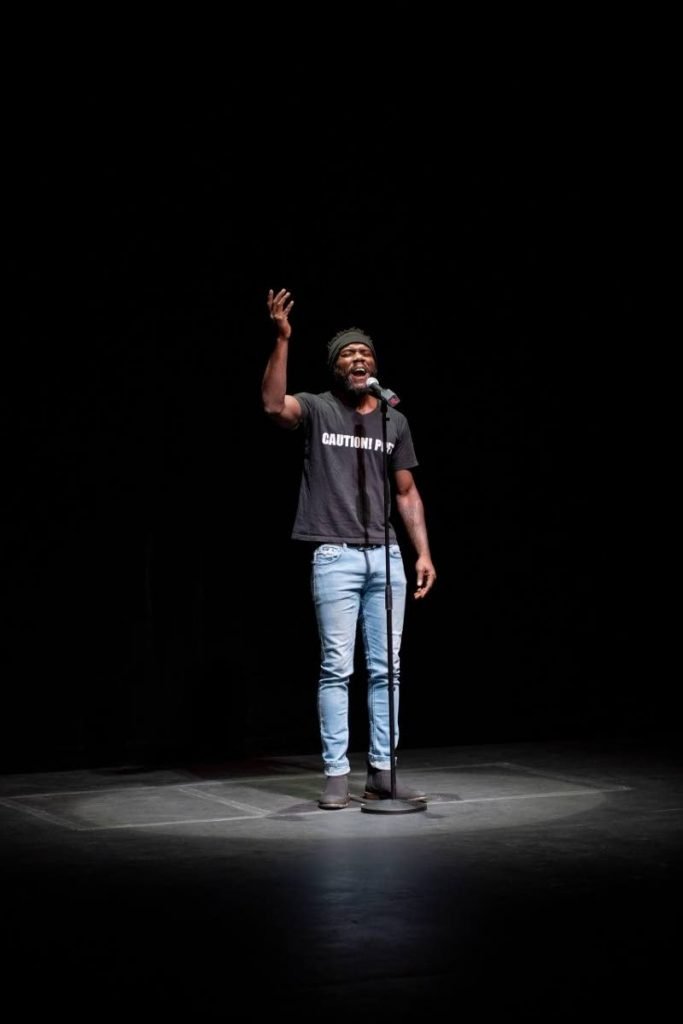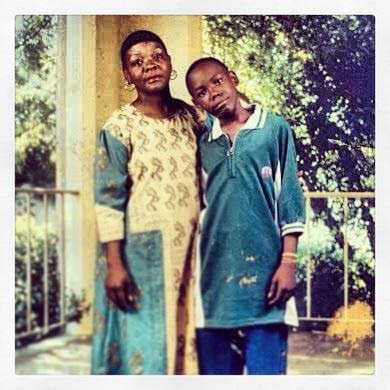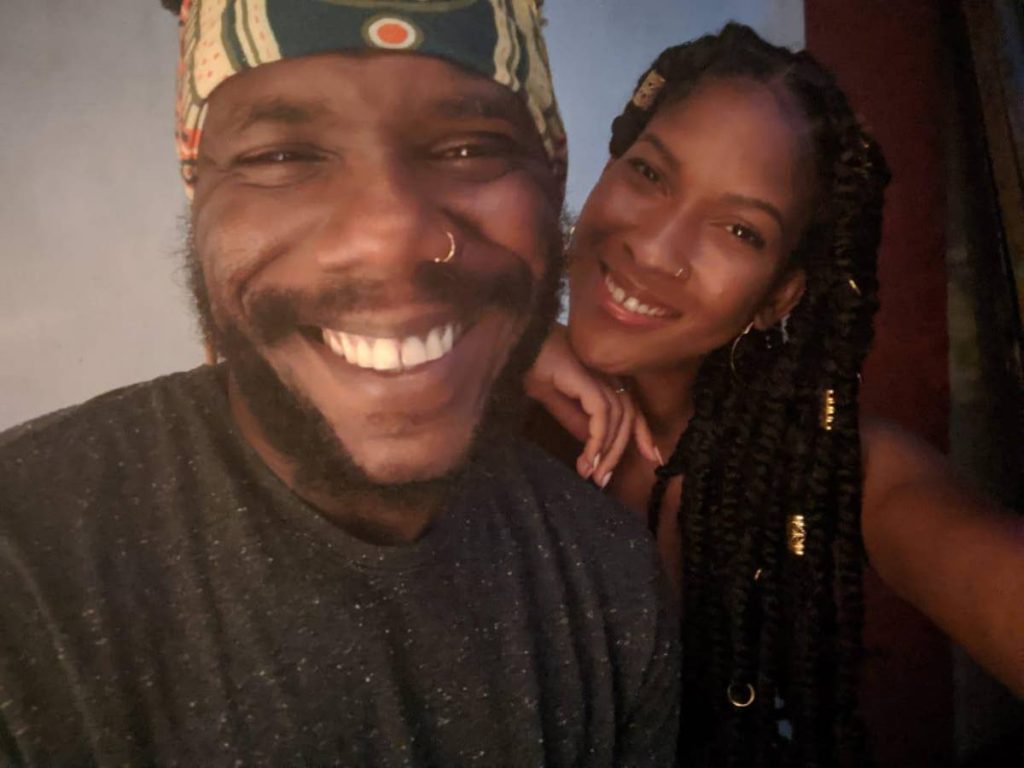Rachael Espinet
6 Hrs Ago

BEFORE Ahmad Abdullah-Muhammad’s mother died she told him not to cry for her. She died when was he 16. He did not cry until he was 23.
He called her Umi, Arabic for Mummy. He said Umi died from complications due to a broken heart. She had Aids, was a domestic violence survivor and saw two of her sons die from a genetic disease before Abdullah-Muhammad turned 14. Umi’s abusive husband was unfaithful and gave her HIV. After he died, she stopped taking her anti-retroviral meds, wanting to die.
“She was lying on a mattress on the ground in the living room. I went to cook. When I saw her I said, ‘Umi, yuh dead?’ Her eyes were open, she wasn’t breathing and I just remember lying down hugging her. I wanted to find out why I could not cry,” he told Newsday in an interview.
Abdullah-Muhammad did not realise how much his childhood and mother’s traumas affected him. He stole, womanised and did everything to numb his pain.
Abudulla-Muhammed placed third at the First Citizens National Poetry Slam on September 27. His poem, Therapy Session, told his life story from childhood trauma to crying therapy.
“The piece was centred around my mother and based on me actually going to therapy, openly understanding that I was affected by her, if not more, by what was going on. Those things were only happening to her and seeing her dealing with it, I didn’t think any of those things were affecting me.”
He started therapy for the first time this year in July. He’s 33 and did not realise how much he needed to talk about his problems in a safe and non-judgmental space.
“It was like an epiphany for me to find out, after going through therapy, that those things were bothering me as well. I was there, but was not the person directly to get licks when my stepfather was beating my mom.”

At 11, he had to learn how to live with less. At 12, he tried to kill himself twice.
“It really made no sense for me to be here…Where I grew up I didn’t know anything about the awareness or meaning of mental health.
“I grew up knowing what it was like not to cry cause you don’t want to be a b–ch or people to see you as less of a man, and I’m real glad therapy happened for me, because that was ruining my relationships.”
He lived in Morvant and was raised as a Muslim. He was harassed because of the Muslim and Rasta warfare in the area.
“People came and left bullet shells outside our home. In that situation, I needed to have some sort of reinforced hardness as a man to be able to navigate the environment and the people who I dealt with. You had to have your big-boy pants on all the time.”
Abdullah-Muhammed lived on his own after his mother died. He worked odd jobs to survive, but for two years he stole, not just for the fast cash, but because he had a death wish.
“The money was faster, more exciting, and I felt like because my two suicide attempts failed, I still wanted to die. I didn’t feel like I had the strength to do it on my own. If I had an encounter with someone who could (kill him) like the police or something, I found comfort in that.”
He credits love for getting his life together.
“I am blessed to have encountered important women who played a major role in my life through advice, understanding, giving of themselves and taking time to get me to see what they were seeing.”
For almost ten years he didn’t cry because he didn’t have anything worth crying about. That inability to be vulnerable destroyed many of his relationships. He hurt the women he loved.
“I didn’t have the emotional intelligence to deal with anger and frustration.”
He repeatedly cheated on the first woman he loved.
“When I told her I loved her, it felt different. It felt different from any of the times…At the time of the relationship, was not in the place to have given her the type of relationship she deserved. I was aware of that, but I could not be who I was at the time and be the person I wanted to be.”
When he was 26, he did not believe in monogamy. Watching his stepfather beat his mother made him vow to never lay a hand on a woman, but his mother’s painful relationships made him not want to be loyal to one woman.
“I never wanted to need one person alone because it did not make sense. Having options just felt like a better move. When I got involved with her, I would have been cheating, running games and been emotionally toxic. I was horrible, but she kept loving me anyway. She definitely gave me more chances than I deserve.”
The penultimate time she ended it with him, Abdullah-Muhammed realised he had to change.
“That night I saw her crying, curled up in a foetal position. That broke my heart. I didn’t want to put anyone through that. From then on, I started to seek proper counselling. Not therapy yet, but counselling to figure out the ways I could improve my interactions.”
After they broke up, he did not end his philandering ways. Instead, he chose not to commit himself to anyone.
“That would have been the end of any relationship. Then I just decided to be a single man-whore after that and try to work on myself, but not fix things.”
He sought counselling from many people, peers, a friend he considers his little brother. That’s when he realised he was not alone with his problems.
“A lot of people around me, were going through the same things. Being a womaniser, cheating, not knowing the proper role for a father figure. When you’re trying to navigate in a world where things are demanded of you as a black man…I realised it’s not me alone and it was refreshing for me to know other people are going through similar instances.”
Eventually Abdullah-Muhammed completed a certificate in television production at Servol and got jobs at Synergy and Gayelle. He now has his own video production company with clients such as Republic Bank and Carifesta.
His latest relationship was what encouraged him to go to therapy.
“It was affecting my relationship. That was a good thing. The thing that was affecting my relationship before was because I was a ‘ho’ cheating on my girl, but now I made the long, hard decision to be in a monogamous relationship. It was something that I wanted to try.”
They had minor arguments, like any typical couple, but he said his level of anger in relation to the nature of the argument was mismatched.

“It was a Teletubby talk and I would respond in a Hulk smash. It was becoming hard and taking a toll. I wanted the relationship to work.”
He said “block therapy” was what most people in his community knew. What made him finally decide to go to therapy was Charlamagne Tha God, host of Breakfast Club Power 105.1FM, who was open about his experience with therapy and how it helped his life, family and marriage.
“I don’t know anyone, no n–ga I know growing up in the hood or Morvant or any people by me go to therapy. You go on the block, you smoke, you talk about your problems, your bredrin and them laugh at you and you heal. Is that healing?”
He got a therapist’s number from a friend but he missed his first three appointments.
“He was talking about how therapy was helping him through his relationships, his marriage, those kinds of things. I thought if Charlamagne could do it, I don’t think it could be that bad.”
He pays $600 a session. His first session was in July and he sees his therapist twice a month.
“It was a huge breakthrough. I enjoy having conversations, conversations that were intensely emotionally managed at the time. I don’t shut down as I used to before. I don’t lash out as much as I used to. I don’t respond to everything with a cuff in face or some kind of violent outburst. It’s a win.
“It was good for me. When I went into the sessions, I went into the understanding that I needed to be vulnerable and as honest as I possibly could be in order for it to work. There were a lot of lies I was telling myself, lies I was telling to other people to protect myself.”
Some of the lies included: “Therapy is for losers. You didn’t overreact, the situation was warranted. Her tone was wrong, he was being an a–hole.”
Now, thanks to his therapist, he is able to see other people’s perspectives and not take their disagreeing views as attacks.
“The perspectives are different, and different does not always mean bad. It’s just different and it is okay to do things differently. To that I am grateful. One of the best decisions I’ve made this year was to go to therapy.”
Source link
